
The Palazzo Giustinian Lolin is a Baroque style palace located on the Grand Canal of Venice, Italy. The present facade was designed circa 1630 by Baldassare Longhena. [1] It is used as an exhibition venue for the Venice Biennale.

The Palazzo Giustinian Lolin is a Baroque style palace located on the Grand Canal of Venice, Italy. The present facade was designed circa 1630 by Baldassare Longhena. [1] It is used as an exhibition venue for the Venice Biennale.
A palace at the site was constructed in the 14th century by the Lolin family, but rebuilt in the 17th century by the Giustianian family with designs of Baldassare Longhena. Longhena's design still maintains traces of the original gothic plan, with narrow peaked windows. His facade stacks the three classical orders: Doric, Ionic, and Corinthian. In the 19th century, the palace had varied residents. In 1836, the doctor Francesco Aglietti died here. Later in the 19th century, it was owned by the dancer Maria Taglioni, and by the former Duchess of Parma, Maria Luisa. [2]
In the 20th century, it was the home of the Ugo and Olga Levi Foundation for Music Studies, founded in 1962. The Levis were a wealthy jewish mercantile and banking family of Venice. The couple was able to survive persecution during the war, hiding as farmers in the countryside. [3]

Vincenzo Scamozzi was an Italian architect and a writer on architecture, active mainly in Vicenza and Republic of Venice area in the second half of the 16th century. He was perhaps the most important figure there between Andrea Palladio, whose unfinished projects he inherited at Palladio's death in 1580, and Baldassarre Longhena, Scamozzi's only pupil.
The Grand Canal is a channel in Venice, Italy. It forms one of the major water-traffic corridors in the city.
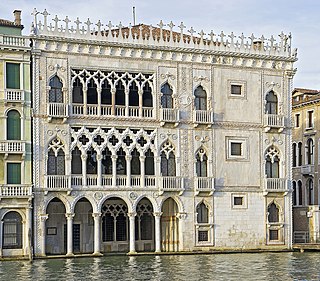
The Ca' d'Oro or Palazzo Santa Sofia is a palace on the Grand Canal in Venice, northern Italy. One of the older palaces in the city, its name means "golden house" due to the gilt and polychrome external decorations which once adorned its walls. Since 1927, it has been used as a museum, as the Galleria Giorgio Franchetti.

Ca' Rezzonico is a palazzo on the Grand Canal in the Dorsoduro sestiere of Venice, Italy. It is a particularly notable example of the 18th century Venetian baroque and rococo architecture and interior decoration, and displays paintings by the leading Venetian painters of the period, including Francesco Guardi and Giambattista Tiepolo. It is a public museum dedicated to 18th-century Venice and one of the 11 venues managed by the Fondazione Musei Civici di Venezia.
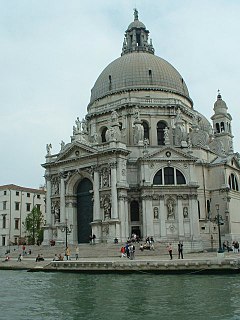
Baldassare Longhena was an Italian architect, who worked mainly in Venice, where he was one of the greatest exponents of Baroque architecture of the period.

Palazzo Labia is a baroque palace in Venice, Italy. Built in the 17th–18th century, it is one of the last great palazzi of Venice. Little known outside of Italy, it is most notable for the remarkable frescoed ballroom painted 1746–47 by Giovanni Battista Tiepolo, with decorative works in trompe-l'œil by Gerolamo Mengozzi-Colonna.

The Palazzo Giustinian is a palace in Venice, northern Italy, situated in the Dorsoduro district and overlooking the Grand Canal next to Ca' Foscari. It is among the best examples of the late Venetian Gothic and was the final residence of Princess Louise of Artois.

Palazzo Belloni Battagia is a palace on the Canal Grande, Venice, northern Italy. It is located in the sestiere (district) of Santa Croce, between the Fondaco del Megio and Ca' Tron, near the church of San Stae.

The Palazzo Clary is a Late Renaissance Venetian palace facing the Giudecca Canal alongside the fondamenta Zattere by the ponte longo in Venice's Dorsoduro. It was originally built in the 17th century for a Venetian noble family. In the early 19th century, the palazzo is known as Palazzo Clary, named after it was bought by the prince Clary-Aldringen. The neighboring building is Palazzo Giustinian Recanati.
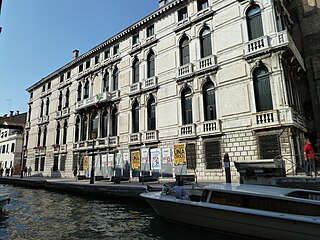
The Palazzo da Lezze or Ca' Lezze is a Baroque palace in Sestiere of Cannaregio in the city of Venice, Italy. It is located on Rio della Misericordia, with a facade on the fondamenta (canal-sidewalk), and stands between the Scuola Grande Nuova della Misericordia and Calle Largo Lezze.
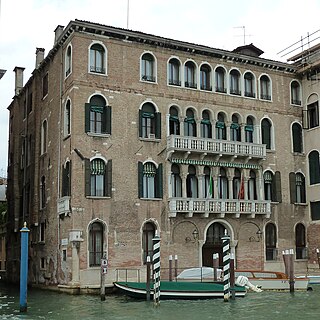
The Palazzo Giustiniani Businello is Gothic-style palace located on the Grand Canal, in the Sestieri of San Polo, adjacent to the Palazzo Papadopoli, in Venice, Italy.

Palazzo Barzizza is a restructured formerly Gothic-style palace located on the Canal Grande of Venice, adjacent to the Palazzo Giustinian Businello in the Sestiere of San Polo, Venice, Italy.
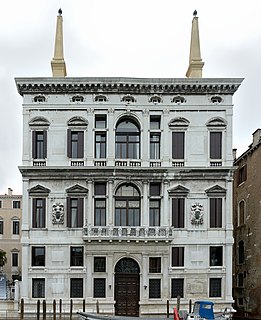
The Palazzo Papadopoli is a Baroque-style palace located on the Canal Grande of Venice, between Palazzo Giustinian Businello and Palazzo Donà a Sant'Aponal in the Sestiere of San Polo, Venice, Italy.

The Palazzo Giustinian Persico is an early-Renaissance-style palace located at the corner with the Rio di San Tomà, near Palazzo Tiepolo and across the canal from Palazzi Mocenigo on the Grand Canal, in the Sestieri of San Polo, Venice, Italy.

The Palazzo Querini Dubois, also known as Giustinian Querini is a Renaissance-style palace in located on the Grand Canal, between the Palazzo Bernardo a San Polo and the Palazzo Grimani Marcello in the sestiere of San Polo of Venice, Italy. It stands across the canal from the Palazzo Corner Spinelli. A second façade faces the rio delle Erbe. Opposite is Palazzo Querini Benzon.

The Ca' Zenobio degli Armeni is a Baroque-style palace structure in the sestiere of Dorsoduro, in Venice, Italy. The nearby bridge Ponte del Soccorso connects it to the Palazzo Ariani.

The Palazzo Loredan Cini is a Gothic-style palace located between the Palazzo Balbi Valier and the Rio San Vio on the Grand Canal, in the sestiere of Dorsoduro, Venice, Italy. The palace was formed from the amalgamation of the former Palazzo Foscari-Loredan with the adjacent Palazzo Grimani. The narrow facade on the Canal has no entrance, but the facade to the north on the Rio, has a single water door, and is connected to the adjacent campo by a bridge. The facade is decorated with two poliforas.

Palazzo Savorgnan is a palace in Venice, Italy, located in the Cannaregio district and overlooking Canale di Cannaregio, to the right of Palazzo Priuli Manfrin.

Palazzo Giustinian Pesaro is a Gothic palace located in Venice, Italy, in the Cannaregio district and overlooking the Grand Canal. The palazzo is situated between Ca' d'Oro and Palazzo Morosini Sagredo.
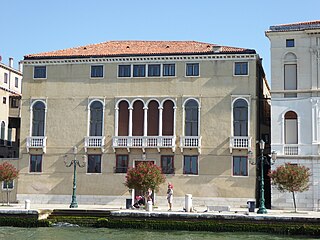
Palazzo Giustinian Recanati is a palace in Venice, Italy, located in the Dorsoduro district and overlooking the Giudecca Canal, just to the left of Palazzo Clary.